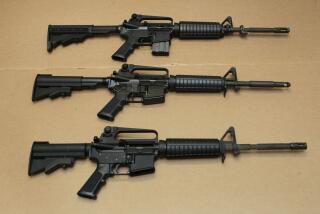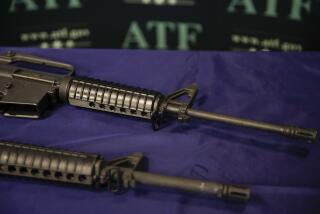Glock Decides Not to Join Gun Industry Settlement
- Share via
WASHINGTON — One of the country’s biggest gun makers refused Tuesday to agree to tight new restrictions on its manufacturing and marketing operations, marking a setback in the Clinton administration’s efforts to impose toughened safeguards on the firearm industry.
Paul Jannuzzo, vice president and general counsel for Glock Inc., said in an interview that the Georgia-based gun manufacturer would not submit to government-sponsored “blackmail.”
Last week, administration officials brokered a ground-breaking agreement with Smith & Wesson, the country’s biggest manufacturer of handguns.
Smith & Wesson agreed to impose new restrictions on its dealers, to put safety locks on all its guns, to accelerate the development of “smart” gun technology and to take other steps that government officials assert will keep guns out of the hands of children and criminals. In exchange, Smith & Wesson is being dropped as a defendant in a number of lawsuits brought by governmental entities--including Los Angeles and more than 15 other cities--that are seeking to hold gun makers liable for violence caused by their weapons.
Officials at the U.S. Department of Housing and Urban Development, active in negotiations on the issue, had hoped that Glock would be the next major manufacturer to agree to the pact.
But Jannuzzo said that a handful of executives at the company, which is owned by an Austrian corporation, talked Tuesday via conference call and decided to “stick to our guns.” Glock estimates that its legal costs in fighting the lawsuits could amount to more than $15 million, but Jannuzzo said that “it’s a matter of principle.”
Most objectionable in the government’s offer, Jannuzzo said, is the creation of an oversight board to monitor and enforce the agreement. “We’re not going to submit to a monitoring process. We already have one--it’s the Bureau of Alcohol, Tobacco and Firearms,” he said.
A HUD spokesman said the agency is continuing negotiations with gun makers and would not comment further.
Glock, the biggest supplier of firearms to U.S. law enforcement agencies, may soon face even greater political pressure to reform its operations.
Several gun control advocates in Washington, Los Angeles, New York and elsewhere have pushed the idea of demanding safety and marketing restrictions on companies such as Glock that sell guns to public agencies. And HUD officials today are set to announce the formation of a nationwide coalition to further explore that idea.
More to Read
Inside the business of entertainment
The Wide Shot brings you news, analysis and insights on everything from streaming wars to production — and what it all means for the future.
You may occasionally receive promotional content from the Los Angeles Times.










